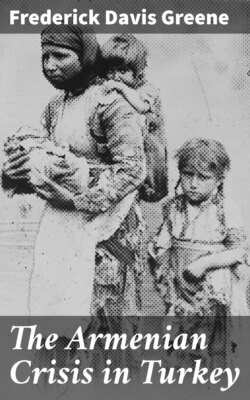Читать книгу The Armenian Crisis in Turkey - Frederick Davis Greene - Страница 19
На сайте Литреса книга снята с продажи.
No. 8.
Оглавление[From another city to which soldiers returning brought details of what they had done.]
E..., Dec. 6, 1894.
The Armenians, oppressed by Kourds and Turks, said, “We can’t pay taxes to both Kourds and the government.” Plundered and oppressed by the Kourds, they resisted them; there were some killed. Then false reports were sent to Constantinople that the Armenians were in arms, in rebellion. Orders were sent to the Mushire [Commander-in-chief] at Erzingan to exterminate them root and branch. The orders read before the army collected in haste from all the chief cities of Eastern Turkey was: “Whoever spares man, woman, or child is disloyal.”
The region was surrounded by soldiers of the army and twenty thousand Kourds also are said to have been massed there. Then they advanced upon the centre, driving in the people like a flock of sheep, and continued thus to advance for days. No quarter was given, no mercy shown. Men, women, and children shot down or butchered like sheep. Probably when they were set upon in this way some tried to save their lives and resisted in self-defense. Many who could fled in all directions, but the majority were slain. The most probable estimate is fifteen thousand killed, thirty-five villages plundered, razed, burnt.
Women were outraged and then butchered; a priest taken to the roof of his church and hacked to pieces; young men piled in with wood saturated with kerosene and set on fire; a large number of women and girls collected in church, kept for days, violated by the brutal soldiers, and then murdered. It is said the number was so large that the blood flowed out of the church door. Three soldiers contended over a beautiful girl. They wanted to preserve her, but she too was killed.
Every effort is being made and will be made to falsify (excuse the blots—emblematic of the horrible story) the facts and pull the wool over the eyes of European governments. But the bloody tale will finally be known, the most horrible, it seems to me, that the nineteenth century has known. As a confirmation of the report, the other day several hundred soldiers were returning from the seat of war, and at a village near us one was heard to say that he alone with his own hand had killed thirty pregnant women. Some who seem to have some shame for their atrocious deeds say: “What could we do, we were under orders?”
NAREG: ANCIENT CHURCH AND MODERN HOVELS.
